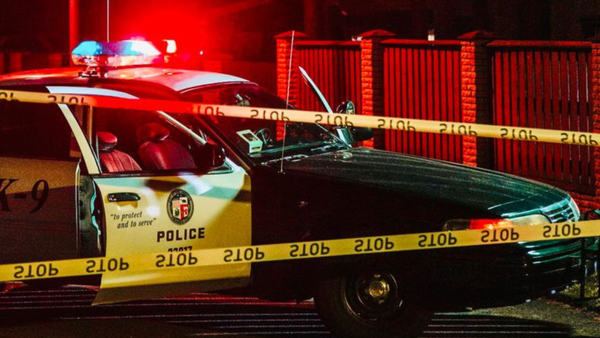
The funniest part of Dave Chappelle’s new special The Dreamer comes right at the top, and not on purpose.
In high-grain black-and-white, we see footage of the comedian’s pre-show ritual before he headlines the stately Lincoln Theater in Washington DC, his home town. To the quaveringly earnest strains of Daydreaming by Radiohead, he smokes a cigarette in silhouette, as if taking a cue from Dewey Cox to think about his whole life before he goes onstage. If someone wanted to create a tone-perfect parody of the self-serious intros that ageing standups use to announce a late phase of maturity and introspection, it would look a lot like this (and in fact it did, when Joe Mande did just that as an ironic bit to open Joe Mande’s Award-Winning Comedy Special in 2017). Chappelle starts his set with an extended anecdote about meeting Jim Carrey on the set of Man on the Moon, when the actor refused to break character as Andy Kaufman, demanding everyone treat him as the person he was pretending to be. And then comes the punchline: that’s pretty much what trans people act like.
It’s a hilariously embarrassing juxtaposition, Chappelle’s solemn-artist windup followed by the opening volley of belabored yet low-effort hackwork, and it tells a viewer everything they need to know about the coming hour. He’s never been more self-involved or less funny, his latest material a flimsy dismissal of his past transgressions that doubles down on the laziest of them at the same time. That this should find a home on Netflix mere days after the platform adds Ricky Gervais’s similarly grievance-driven Armageddon points to the emergence of an unsavory new niche in comedy.
Though the two both rank as A-list celebrities on merit of their illustrious careers, their latest work has seen a quiet, unceremonious and frostily received release. These bits offer no insight, and in many of their longer-winded passages, scarcely contain anything that could be classified as a joke. These once-esteemed talents formerly dedicated to puncturing racial tensions or hollow pieties now argue only for the unfairness of their own persecution, and their bravery in resisting it. This is Crank Comedy.
Much of Chappelle’s set processes a 2022 incident in which a disgruntled member of the audience at Los Angeles’s Netflix Is a Joke Festival stormed the stage in an attempted attack triggered by jokes about the queer community and the homeless. While the episode spurred Chappelle to consider his mortality, he mostly makes it seem like a blessing in disguise, the ultimate vindication for his portrayal of his opponents as unstable extremists disconnected from reality. “I am Will Smith!” he declares during a riff on Smith’s infamous Academy Awards dustup with Chris Rock. “I am the man who can not take it any more, and will slap the shit out of the next person who says a cross word to me.” These words are greeted with howls of approval from the crowd, same as when he reasons that if he’d been the one getting hauled away in cuffs the year prior, he’d simply identify as a woman for placement in a cushier jail. In the space of one pause, a guy in the crowd yells: “We love you!” It almost sounds like he’s trying to prove something.
Watched in close succession, these specials confer the impression of men racing to find new lines they can easily, emptily cross. Chappelle makes the baffling assertion that only gay men appear in photos with their mouths open; Gervais tells actors with dwarfism who might object to present-day stage productions of Snow White to just be grateful that they’re not being used as “props”. He cracks himself up with one line before he can even tell it, feigns holding it back because it’s just “too offensive”, then sallies forth upon receiving sufficient encouragement from his adoring public: a Chinese pedophile tries to bait a child with the promise of a puppy, except the boy says he’s not hungry. This is not only entry-level racism, it’s weak writing, recycling the oldest stereotype in the book as cutting-edge envelope-pushing. Jerry Seinfeld’s immortal words come to mind: “No, it offends me as a comedian!”
Gervais’s satire doesn’t even function properly as commentary any more, its convenient elisions constantly undermining the last-sane-man persona he’d like to cultivate. He zeroes in on a would-be hypocrisy, his favorite type of target, in the double standard of tearing down statues of problematic historical figures while leaving the hospitals and canals that they built intact. He chooses to ignore the fact that the venerated nobles did not actually construct any of those things, but that’s hardly the point; even if they had, hospitals and canals have a utility where statues proffer honor for display. Any rational person understands this as a false equivalency, much like when Gervais checkmates the wokesters by positing that Black people calling each other the N-word counts as cultural appropriation from white slaveowners. He’s peddling unsophisticated thought, no longer credible as funnyman nor atheist smart alec.
Even so, he works up an intellectual sweat contriving circumstances that allow him to say naughty words with impunity, like one of those online weirdoes demanding to know whether you’d use a racial slur if it was the only way of stopping a bomb. Would it be acceptable to make fun of a child for being disabled … if we knew they were also a bigot?! He presumes the answer is yes, even though it’s still no, both because this is a patently unreal scenario and because it would be more fruitful to mock him for being a racist. At any rate, none of this matters, as Gervais explains that he’s merely playing a character. He asserts that he’s no more an everything-phobic lout than Anthony Hopkins is an urbane cannibal, unaware that the “I’m only having a laugh!” defense works best when it actually generates laughs instead of delighted, expected recognition.
Both Gervais and Chappelle conclude with gestures toward bridge-building, each one concealing self-exculpatory intention. Chappelle saves face by saying that “men enforce boundaries, men test boundaries, and no one tests more boundaries than a trans man,” likening them to himself as fellow “dreamers”. Gervais gathers everyone together under the wobblier axiom of “whatever you find funny, all laughter is good.” Never mind that both of these statements are incorrect – trans men don’t dream of being men, they are men, and it’s not even hard to think of examples of cruel, inhumane laughter – they’re futile efforts to advance through a creative dead end.
Beyond here lies nothing but more of the same, and not just the same bizarre, unwarranted targeting of the trans community that Chappelle last trotted out for Sticks and Stones in 2019. The same dependable approval from the same class of reactionary, the same depressed disappointment from the same ex-fans, the same checks from Netflix. This guaranteed bloc of sycophants comes with the cost of irrelevance, however, evident in the inability of these specials to make a dent in the mainstream. When a comedian wraps himself in a cocoon of his own ideas and surrounds it with those who find them agreeable, he loses the ability to see the outside world.







